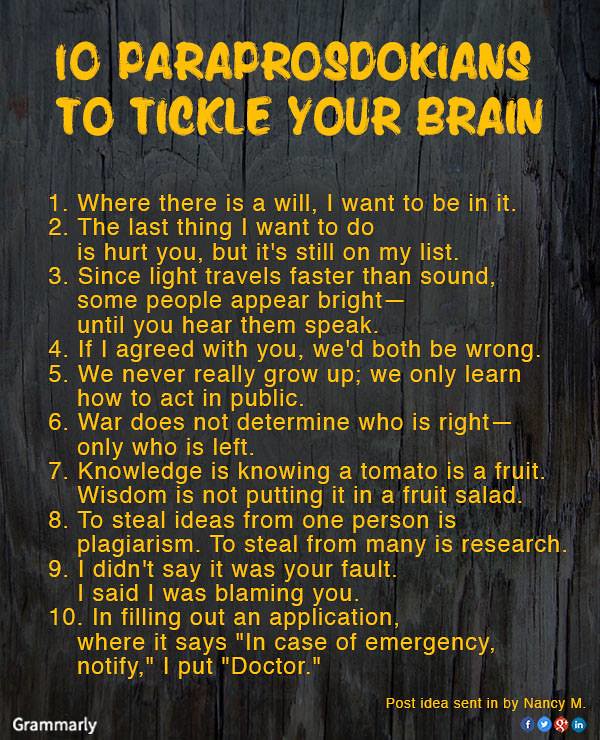Το σχήμα «πάρα προσδοκίαν» (όπου άλλο περιμένει ο αναγνώστης ή ο ακροατής και άλλο του έρχεται) έχει χρησιμοποιηθεί για να περιγράψει κυρίως τεχνικές του Αριστοφάνη. Το παρακάτω πάντως γράφτηκε για τα σχήματα λόγου στον Δημοσθένη:
Παρὰ προσδοκίαν δ' ἐστὶν ὅταν, ἄλλο τοῦ ἀκροατοῦ προσδεχομένου, ἄλλο μετά τινος χάριτος ἐπενέγκῃ.
(Tiberius Rhet., De figuris Demosthenicis)
Ο Ροΐδης είχε βαφτίσει «κολοκυνθοπληγία» την αντίστοιχη δική του τεχνική:
Ο Ροΐδης […] είχε παρομοιάσει το ύφος του με την μέθοδο της «κολοκυνθοπληγίας», δηλαδή του χτυπήματος στο κεφάλι του αναγνώστη με μια ξερή κολοκύθα. Αυτό ήταν, όπως εξηγούσε, ένα «ανθυπνωτικόν φάρμακον», δηλαδή ο μόνος τρόπος για να κρατάει σε ενδιαφέρον και εγρήγορση τον (απαίδευτο) Έλληνα αναγνώστη.
http://el.wikipedia.org/wiki/Εμμανουήλ_Ροΐδης
Ο Σάιμον (thank you, Simon) υπέδειξε την απολαυστική συλλογή αγγλικών «παρά προσδοκίαν» στη σελίδα της Wikipedia: http://en.wikipedia.org/wiki/Paraprosdokian
Χρησιμοποιείται το σχήμα και στην παραποίηση γνωστών γνωμικών και παροιμιών:
Where there's a will, I want to be in it.
Mary had a little lamb; the midwife was surprised.
Των φρονίμων τα παιδιά ξέρουν κι άλλο μονοπάτι.
Παρὰ προσδοκίαν δ' ἐστὶν ὅταν, ἄλλο τοῦ ἀκροατοῦ προσδεχομένου, ἄλλο μετά τινος χάριτος ἐπενέγκῃ.
(Tiberius Rhet., De figuris Demosthenicis)
Ο Ροΐδης είχε βαφτίσει «κολοκυνθοπληγία» την αντίστοιχη δική του τεχνική:
Ο Ροΐδης […] είχε παρομοιάσει το ύφος του με την μέθοδο της «κολοκυνθοπληγίας», δηλαδή του χτυπήματος στο κεφάλι του αναγνώστη με μια ξερή κολοκύθα. Αυτό ήταν, όπως εξηγούσε, ένα «ανθυπνωτικόν φάρμακον», δηλαδή ο μόνος τρόπος για να κρατάει σε ενδιαφέρον και εγρήγορση τον (απαίδευτο) Έλληνα αναγνώστη.
http://el.wikipedia.org/wiki/Εμμανουήλ_Ροΐδης
Ο Σάιμον (thank you, Simon) υπέδειξε την απολαυστική συλλογή αγγλικών «παρά προσδοκίαν» στη σελίδα της Wikipedia: http://en.wikipedia.org/wiki/Paraprosdokian
Χρησιμοποιείται το σχήμα και στην παραποίηση γνωστών γνωμικών και παροιμιών:
Where there's a will, I want to be in it.
Mary had a little lamb; the midwife was surprised.
Των φρονίμων τα παιδιά ξέρουν κι άλλο μονοπάτι.
Last edited:


